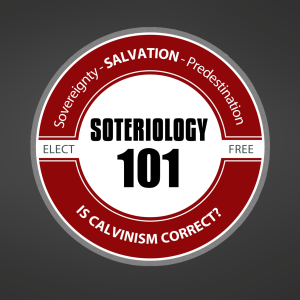
Soteriology 101 w/ Dr. Leighton Flowers
Religion & Spirituality:Christianity

Dr. Leighton Flowers presents a short explanation of Jesus's parable of the Wedding Banquet in Matthew 22.
There are several divine choices made by God to bring about redemption.
1) The election of the nation that the king ruled over in the parable (representing Israel)
2) The election of the servants from that nation to deliver the wedding invitations (representing prophets/apostles).
3) The election of those who would receive the invitations (representing the message going first to the Jews and then to the Gentiles)
4) The election to permit those properly clothed in wedding garments to enter (representing those clothed in Christ’s righteousness by faith)
The moral of Christ’s parable was, “Many are called, but few are elect” (v. 14). In other words, many are “unconditionally” invited by “unconditionally” elected servants from an “unconditionally” elected nation.
- The nation was not chosen because it was more moral or more deserving (i.e. “unconditional”)
- The servants from that nation were not selected because they were more moral or more deserving. (i.e. “unconditional”)
- And the invitations were not sent to people because they were more moral or deserving. (i.e. “unconditional”)
- The invitation (WORD) was brought to the world through a nation (and individually selected servants from that nation). This is what Christ is referencing when he says, “many are called.”
What does Christ mean by “few are elect?” Clearly, this is in reference to those conditionally permitted entrance into the banquet based upon their being properly clothed in the right wedding garments. The King elects to permit those rightly clothed to come in while the rest are cast out. Likewise, God will only permit those clothed in the righteousness of Christ to enter heaven. The “few” who are “elect” were clearly conditionally chosen based upon their garments (the righteousness of Christ). This is the foundational understanding of “corporate election to salvation.” We are elect only insofar as we are connected with Christ (clothed in His righteousness).
This parable, like Romans 9, includes all of the King’s choices, not just the last one. In other words, the parable involves not only the King’s choice to grant or deny an individual’s entrance into the banquet, but also the King’s choices in fulfilling his purposes through his own nation and those individual servants selected to deliver the invitations. Likewise, Paul, in Romans 9, has all of these divine choices well in view.
For more please visit www.soteriology101.com
More Episodes
 2023-02-01
2023-02-01
 2022-12-15
2022-12-15
 2022-11-09
2022-11-09
 2022-10-21
2022-10-21
 2022-10-03
2022-10-03
 2022-09-26
2022-09-26
 2022-09-14
2022-09-14
 2022-09-01
2022-09-01
 2022-08-15
2022-08-15
 2022-07-21
2022-07-21
 2022-07-11
2022-07-11
 2022-06-27
2022-06-27
 2022-06-17
2022-06-17
 2022-06-05
2022-06-05
 2022-05-26
2022-05-26
 2022-05-11
2022-05-11
Create your
podcast in
minutes
- Full-featured podcast site
- Unlimited storage and bandwidth
- Comprehensive podcast stats
- Distribute to Apple Podcasts, Spotify, and more
- Make money with your podcast
It is Free
- Privacy Policy
- Cookie Policy
- Terms of Use
- Consent Preferences
- Copyright © 2015-2024 Podbean.com



